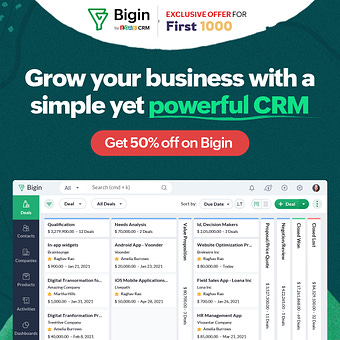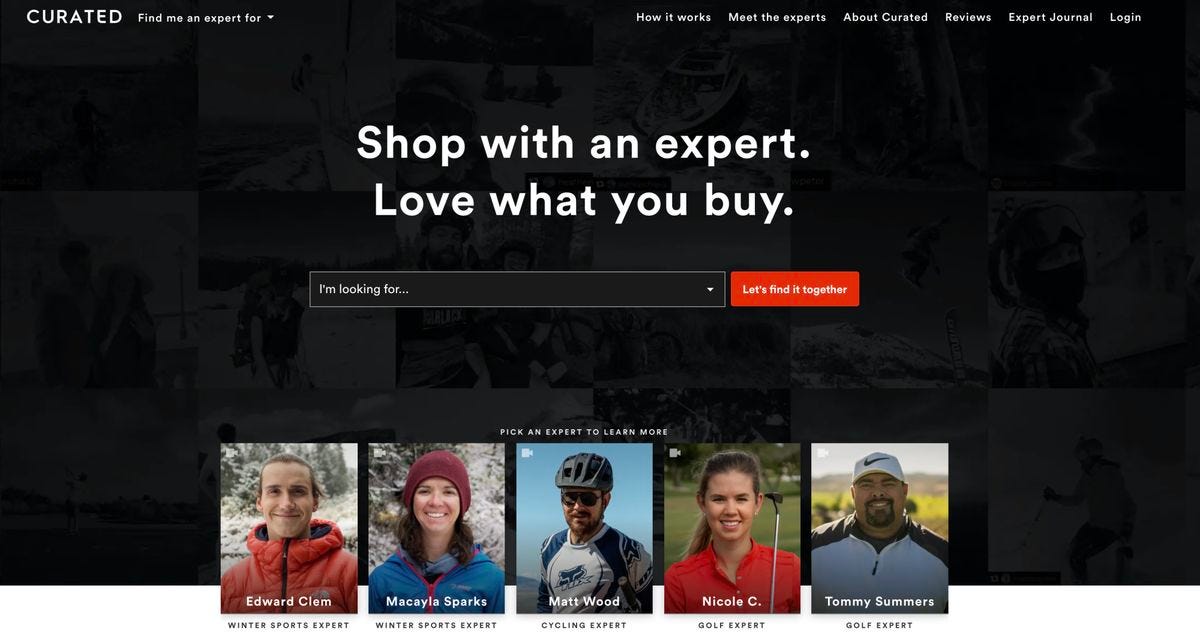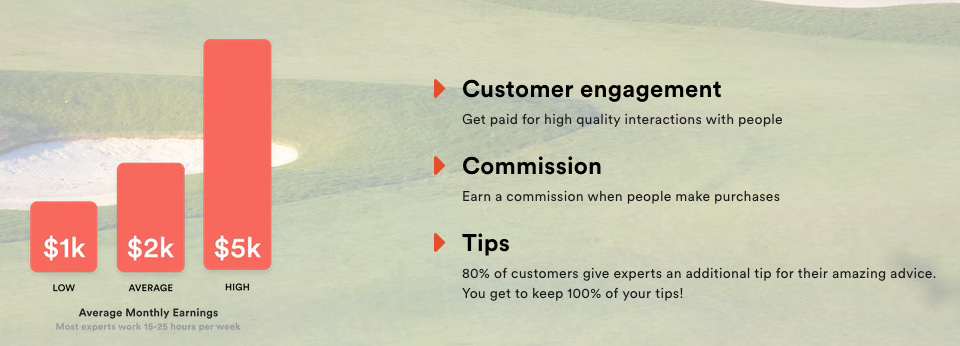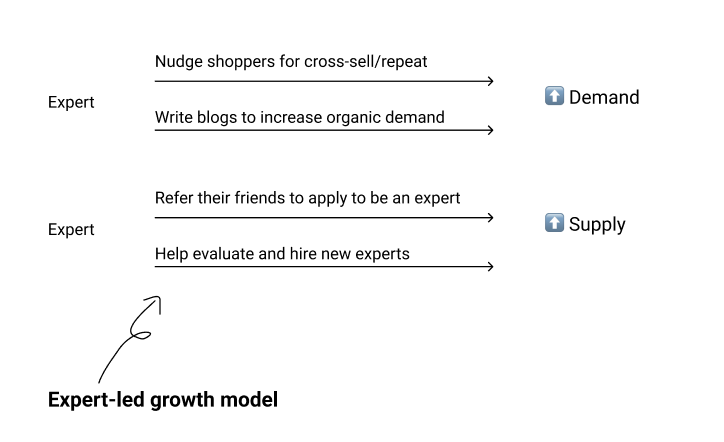First 1000 - 🏌️Curated
If this was forwarded your way and you wish to sign up to First 1000, you can do so here :) Today’s Issue is brought to you by:Bigin by Zoho CRM: The simplest CRM solution ever!Bigin is the only CRM solution in the market that is built specifically for small businesses, trusted by over 7500 global customers which include startups, solopreneurs, and creators. It balances the usefulness of a CRM with the simplicity of a spreadsheet at a fraction of the cost. Anyone can set it up from scratch, and get started in 30 minutes or less. Check it out and get 50% off today. — By: Leo Luo from Consumer Strartups One of my biggest personal theses is that more and more people will be able to make money from doing things they love. According to a Zapier report, one in three Americans has a side hustle and one in four Americans plans to start one. It also states that while passive income is the primary reason why people start a side hustle, passion is the close second - almost 40% say they started the side hustle to pursue something they enjoy doing. The side hustle boom is also intersecting with the rise of the creator economy. As creator economy platforms and tools continue to blossom, the barriers to becoming a creator or a micro-entrepreneur decreased drastically. In the past two years, I have had the opportunity to cover quite a few startups in the space. Here is a few of them:
The star of today’s newsletter is Curated. Curated empowers experts/enthusiasts to make money from talking about their biggest passions and helps shoppers to make the right purchase with the guidance of a domain expert. It’s on track to do $100M+ in revenue this year and has raised from top investors like Capital G, Forerunner Ventures, Greylock, and many more. I got the opportunity to interview Eduardo Vivas about his story building Curated. Wondering how Curated is leveraging the supply-side to amplify its growth flywheel? Keep reading to find out. The concept of a guided shopping experience is not novel. In the offline world, shopping has always been a collaborative, guided experience, especially for items that tend to be more expensive, such as outdoor sports gear and luxury apparel. In the digital world, it’s also not entirely new. A decade ago, a company called Hunch used machine learning and predictive modeling to recommend products to its users based on different signals around the web. It was eventually sold to eBay in 2011. In recent years, the concept of buying personalized products has become quite popular. Many online consumer brands, such as Prose, are personalizing their product offerings to consumers based on a survey the consumer fills out prior to the purchase. Nevertheless, none of them could provide a high-touch shopping experience online that would help consumers to make a purchase with a human expert. It’s hard to scale a quality expert network, and it is also challenging to achieve favorable unit economics for an e-commerce platform if you have to subsidize the expert side. However, Curated figured them out. Genesis of CuratedEduardo Vivas, the CEO and Co-founder of Curated, is no stranger to building marketplaces and creating scalable companies. Prior to founding Curated, he built Bright.com, an AI-powered platform to connect job seekers with relevant employers. He sold Bright.com to LinkedIn for the tune of $120M, and for the subsequent few years, Eduardo led the product and strategy teams for LinkedIn’s Talent Solutions business. Eduardo got the idea for Curated from a skiing trip to Colorado. As a beginner, Eduardo rushed into buying the highest-rated luxury gear thinking that he couldn’t go wrong with that option. However, the fancy gear made it challenging and he struggled every time he skied. After a while, he decided to consult with a snowboarding instructor. Eduardo quickly learned that he needed cheaper boards and boots that were more suitable for his level. He wished he had been able to get some unbiased expert advice before spending thousands of dollars. This trip was an aha moment for Eduardo. In 2017, He recruited a few of his LinkedIn buddies and started building Curated to help consumers make the best purchase online with the help of a human expert. Product journey and idea validationMVPThe team's first attempt at the problem was to connect shoppers with retailers. The idea was that retailers had experts that could help with online shoppers on Curated. However, they quickly pivoted away from this initial positioning due to a couple of key realizations:
To make it work, they had to hire experts themselves. Demand testingBefore building out the full-fledged platform, Eduardo and his team wanted to make sure there is enough demand for being an expert and shopping with an expert online. On the expert side - the Curated team posted ads about their platform on Craigslist about hiring experts and they got inundated with inquiries and many people asked if the job postings were fake. It was very clear from the beginning that many people are very interested in the idea of making money from just chatting about their passions. On the consumer side - they launched the Curated website with a simple 10-question questionnaire and marketed it online to see how many people would fill it out and give out their phone numbers. The team validated there was solid demand, and most importantly, that as long as the questions were relevant, they could collect user intention data at a relatively low cost. These two experiments provided the team with the confidence to invest more into this idea. Sign of PMFAfter validating interest from both shoppers and experts, Eduardo and his team went out to hire experts themselves and launched the V1 platform. They knew they were onto something when a ton of customers reached out during the early days and asked how they could tip the experts after a purchase, which is not common for a retail experience. The economics of the businessBusiness modelCurated uses an “expert-assisted” retail model. The company buys products at wholesale prices from brand partners and sells them to customers at retail prices. They have their own warehouse to fulfill orders. On the front end, experts curate the products and recommend the relevant ones to shoppers. To ensure unbiased advice, experts are free to promote any product that they would like. If a product recommended by the expert is not on the platform, Curated will send customers to a partner retailer or help customers buy the product from a third party directly. This expert-assisted business model works for a few reasons:
Even though they have to pay experts for each product they sell, Curated is still able to have favorable economics due to high AOV, high conversion rate, high tipping rate, and low return rate. Expert economicsExpert experience is a key north star for Curated. To ensure the entire experience works, the platform has to make sure that experts are happy and continue to feel motivated to serve their customers. There are two main drivers for why an expert takes this gig - passion and compensation. Passion is something that is intrinsic to this model. Experts on the platform love what they are promoting and they enjoy sharing with other people. However, most experts are employed elsewhere and are busy so it is important to provide a strong financial incentive to get experts excited about providing a good experience for each and every shopper. There are three types of income sources for experts:
The average income per month will likely vary depending on the expert and the category. Based on Curated’s website, for an average month, an expert that works 15-25 hours per week can make anywhere from $1K to $5K. Also, a skiing expert that recommends skiing gears will likely make more than experts that recommend tennis racquets since the average order value of the skiing category tends to be bigger than that of the tennis category. Growth FrameworksCategory expansion frameworkOne of Curated’s biggest growth levers is category expansion. One way to look at category expansion is growth within the existing categories. Curated currently focuses on outdoor sports, covering eight different categories from snowboarding to tennis. For example, in just the camping and hiking category alone, Curated has 11 subcategories, which also has another 5-10 sub-categories within. Since the market size of the eight existing outdoor sports categories is already large, the team can continue to grow by expanding to more subcategories and partnering with more brands to capture even broader customer segments. The hiking gear and equipment market alone was estimated to be $5.8B in 2020. Not surprisingly, Curated has been able to grow 100%+ year over year in its existing categories. Curated’s camping and hiking category Besides expanding within existing categories, Curated is also expanding to new categories. There are three main factors that the team looks at when evaluating a new category - unit economics, the size of the passionate fanbase, and cross-selling potential.
This systematic approach of both growing within existing categories and expanding to new ones has been pivotal for Curated’s rapid growth. Expert-led growth modelA unique part of Curated’s growth story is its expert-led growth model. Experts help grow the company on both the demand side and expert supply side. On the demand side, experts own the relationship with the shopper so not only can it help the shopper to place their first order, but they can also encourage repeat purchases or even cross-sell the shopper by introducing them to other categories. Additionally, experts also play a huge part in SEO and content marketing. Curated has a page called Expert Journal and many experts from all categories contribute to the posts. This expert-led content marketing approach is a scalable way to create authentic content that can be helpful for both prospective shoppers and SEO domain ranking. On the supply side, experts also play the main role in recruiting other shoppers. Curated has a social hiring model. The principle is that experts know who are the other experts the best. Existing experts often refer their other expert friends to join the platform and they also play a big role in evaluating and interviewing the potential experts. This expert-led hiring model allows Curated to quickly identify and acquire the right experts at scale. Leveraging the supply side to increase both the supply and demand can be a great growth framework for many marketplace startups. Closing thoughtsCurated has raised over $140M from VCs to date and it is on its way to reaching 9-digit revenue this year. For Eduardo, this is just the beginning and he has a big vision for the company. Here is a snippet from his interview with Harry Stebbings from 20 Mins VC.
That’s it for this week! See you soon 👋, Leo |
Older messages
Sick Day
Tuesday, April 19, 2022
:(
💳 Stripe
Tuesday, April 12, 2022
Everything you didn't know about the Stripe 0->1000 story
Tips & Examples: April Fools
Tuesday, April 5, 2022
Break through the noise!
🕹 Referrals
Wednesday, March 30, 2022
The what, how and why behind First 1000's referral program
Lyft
Tuesday, March 22, 2022
+ seizing opportunities!
You Might Also Like
🗞 What's New: ~40% of young adults get their news from influencers
Saturday, November 23, 2024
Also: "File over App" for digital longevity ͏ ͏ ͏ ͏ ͏ ͏ ͏ ͏ ͏ ͏ ͏ ͏ ͏ ͏ ͏ ͏ ͏ ͏ ͏ ͏ ͏ ͏ ͏ ͏ ͏ ͏ ͏ ͏ ͏ ͏ ͏ ͏ ͏ ͏ ͏ ͏ ͏ ͏ ͏ ͏ ͏ ͏ ͏ ͏ ͏ ͏ ͏ ͏ ͏ ͏ ͏ ͏ ͏ ͏ ͏ ͏ ͏ ͏ ͏ ͏ ͏ ͏ ͏ ͏ ͏ ͏ ͏ ͏ ͏ ͏ ͏ ͏ ͏ ͏
Initiator Creator - Issue 145
Saturday, November 23, 2024
Initiator Creator - Issue #145 - ( Read in browser ) By Saurabh Y. // 23 Nov 2024 Presented by NorthPoll This Week's Notes: Content-rich designs looks more convincing I just love how Basecamp
🛑 STOP EVERYTHING 🛑 BLACK FRIDAY IS NOW!
Saturday, November 23, 2024
This is your sign to take action—2025 could be your breakthrough year, but only if you start now. Black Friday_Header_2 Hey Friend , This is getting serious. We're handing over $1700 in value as
What’s 🔥 in Enterprise IT/VC #421
Saturday, November 23, 2024
Thoughts from Goldman's PICC + optimism for 2025? ͏ ͏ ͏ ͏ ͏ ͏ ͏ ͏ ͏ ͏ ͏ ͏ ͏ ͏ ͏ ͏ ͏ ͏ ͏ ͏ ͏ ͏ ͏ ͏ ͏ ͏ ͏ ͏ ͏ ͏ ͏ ͏ ͏ ͏ ͏ ͏ ͏ ͏ ͏ ͏ ͏ ͏ ͏ ͏ ͏ ͏ ͏ ͏ ͏ ͏ ͏ ͏ ͏ ͏ ͏ ͏ ͏ ͏ ͏ ͏ ͏ ͏ ͏ ͏ ͏ ͏ ͏ ͏ ͏ ͏ ͏ ͏ ͏ ͏
I'm blue
Saturday, November 23, 2024
Hey, tl;dr – I've decided to delete all my Twitter posts, lock down my account, and leave the platform. And I'm going all-in on Bluesky, which (in the last month) has become 1000x more fun
🚀 Globalstar to the Nasdaq
Saturday, November 23, 2024
Plus $RKLB CEO becomes a billionaire, DIRECTV $SATS debt deal called off, TEC's $160M Series B, and more! The latest space investing news and updates. View this email in your browser The Space
Theory Two
Friday, November 22, 2024
Tomasz Tunguz Venture Capitalist If you were forwarded this newsletter, and you'd like to receive it in the future, subscribe here. Theory Two Today, we're announcing our second fund of $450
🗞 What's New: AI creators may be coming to TikTok
Friday, November 22, 2024
Also: Microsoft's AI updates are helpful for founders ͏ ͏ ͏ ͏ ͏ ͏ ͏ ͏ ͏ ͏ ͏ ͏ ͏ ͏ ͏ ͏ ͏ ͏ ͏ ͏ ͏ ͏ ͏ ͏ ͏ ͏ ͏ ͏ ͏ ͏ ͏ ͏ ͏ ͏ ͏ ͏ ͏ ͏ ͏ ͏ ͏ ͏ ͏ ͏ ͏ ͏ ͏ ͏ ͏ ͏ ͏ ͏ ͏ ͏ ͏ ͏ ͏ ͏ ͏ ͏ ͏ ͏ ͏ ͏ ͏ ͏ ͏ ͏ ͏ ͏ ͏ ͏
behind the scenes of the 2024 digital health 50
Friday, November 22, 2024
the expert behind the list is unpacking this year's winners. don't miss it. Hi there, Get an inside look at the world's most promising private digital health companies. Join the analyst
How to get set up on Bluesky
Friday, November 22, 2024
Plus, Instagram personal profiles are now in Buffer! ͏ ͏ ͏ ͏ ͏ ͏ ͏ ͏ ͏ ͏ ͏ ͏ ͏ ͏ ͏ ͏ ͏ ͏ ͏ ͏ ͏ ͏ ͏ ͏ ͏ ͏ ͏ ͏ ͏ ͏ ͏ ͏ ͏ ͏ ͏ ͏ ͏ ͏ ͏ ͏ ͏ ͏ ͏ ͏ ͏ ͏ ͏ ͏ ͏ ͏ ͏ ͏ ͏ ͏ ͏ ͏ ͏ ͏ ͏ ͏ ͏ ͏ ͏ ͏ ͏ ͏ ͏ ͏ ͏ ͏ ͏ ͏ ͏ ͏



